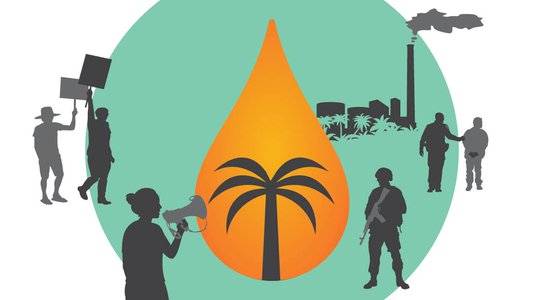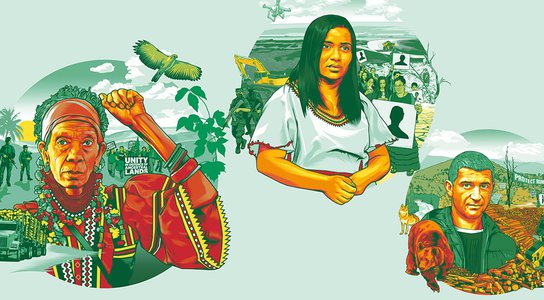Global Witness investigation exposes how two US agribusiness giants – ADM and Bunge – source from Indonesian palm oil mills linked publicly to human rights abuses and land grabs.
December 10, 2020: Nearly 40% of a sample of Indonesian palm oil mills supplying two of the world’s largest commodity traders – ADM and Bunge – are publicly linked to land, environmental and human rights abuses.
In a new report Trading Risks: How ADM & Bunge are failing Land & Environmental Defenders in Indonesia, Global Witness uncovers how ADM and Bunge are failing to ensure the hundreds of Indonesian palm oil mills they source from are free from human rights abuses and land grabs.
Global Witness calls on both companies to adopt policies to stop land grabbing in their supply chains and to ensure that land and environmental defenders – those communities and individuals that take a stand against the damaging exploitation of natural resources and the environment – are protected.
Global Witness found that 129 of 330 sampled mills have been accused of violating local community land rights, criminalising or attacking defenders, and/or causing serious environmental degradation.
Indonesia – the largest palm oil exporting country in the world with approximately 60% of global market share – is rife with corruption, and environmental and human rights abuses related to palm oil harvesting and processing. The development of this industry in Indonesia has also come at a heavy price, with millions of hectares of biodiverse forests felled – and the land and human rights of indigenous and local communities ignored.
Indonesia is also one of the deadliest countries in Southeast Asia for land and environmental defenders – those who stand up to protect their homes and our planet – with 12 defenders killed since 2015, according to Global Witness.
“Under international standards, global agribusiness companies have clear responsibility to monitor and address the human rights and land rights abuses in their supply chains,” said Ali Hines, Senior Campaigner at Global Witness. “Our investigation shows ADM and Bunge are failing to meet these international standards – and the frequency of reports of serious abuses in their supply chains is alarming.”
“Nearly 40% of sampled palm oil mills had credible allegations against them, yet barely any of these allegations are being investigated or addressed by the two companies,” said Hines.
This failure to identify and prevent human rights abuses and conflict in their supply chains means that consumers unknowingly purchase conflict-tainted products. Palm oil sourced by ADM and Bunge ultimately ends up in these products shipped around the globe from some of the world’s biggest brands such as Nestle, Unilever and PepsiCo, all of whom have sustainability commitments on palm oil.
Yet ADM and Bunge do not have sufficient checks or mitigation processes in place to ensure the mills they source from are free from abuses, which is why nearly 40% of the sample of Indonesian mills we analysed have reportedly been associated with environmental and land rights abuses – such as land grabbing – or human rights violations of local communities.
ADM rejected Global Witness’ evidence base and our analysis of their due-diligence process. However, ADM investigated all mills identified in this report as linked to land and human rights abuses. ADM replied to Global Witness that it would be monitoring 9 mills identified in our report, and continuing investigations on a further 36 mills. It closed investigations or otherwise declined to investigate the remaining mills.
Bunge acknowledged that the alleged incidents were in Bunge’s indirect supply and reiterated that the company includes credible instances of human rights violations in its grievance list for engagement.
Global Witness calls on ADM and Bunge to develop and implement a zero-tolerance policy to ensure land and environmental defenders are protected from threats and violence, as well as to ensure effective measures are in place to remedy abuses. Both companies must ensure that their sourcing of agricultural products has not come at the cost of community land rights throughout their supply chain. Moreover, both companies should leverage their influence with governments in the countries they operate – such as Indonesia – to ensure defenders are adequately protected.
“As consumers increasingly call on companies to ensure their products do not threaten local communities’ livelihoods or land rights, it’s important that ADM and Bunge take note and publicly commit to developing and implementing policies to ensure their supply chains are free from abuse,” said Hines. “To ignore these calls is both financially costly and legally risky.”

